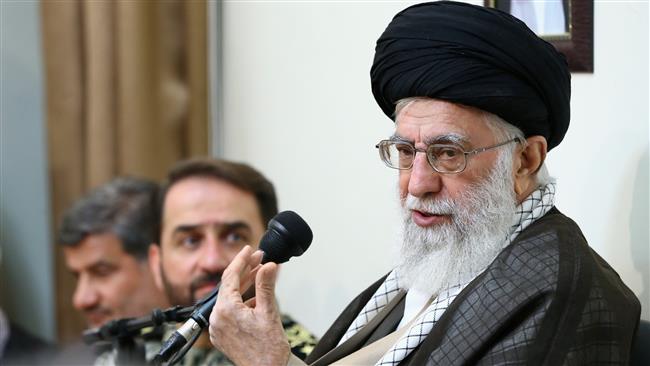LATEST
Amid sanctions, internal disputes, and issues over management, the Supreme Leader has proclaimed that “capable manpower” can solve all of Iran’s economic problems.
Ayatollah Khamenei made the statement on Sunday as he met commanders and officials of the Revolutionary Guards’ engineering branch Khatam al-Anbia. He said that the “capable manpower” has “an unparalleled role in the progress of various sectors”.
Khamenei offered no published comment on the effect of ongoing and new US sanctions, which have hindered trade and investment with foreign companies from areas such as Europe. Nor did he refer to the tensions between Rouhani and the Revolutionary Guards over the Guards’ extensive holdings in the Iranian economy.
Rouhani has said that the economy can only progress if it is opened up to more firms and investors in key sectors. The Guards have large shares of many Iranian firms and, through Khatam al-Anbia, control many of Iran’s major projects in areas such as transportation, logistics, construction, and energy.
But Khamenei gave enthusiastic backing to Khatam al-Anbia. He praised its “cooperation with Iran’s Defense Ministry, universities, and other scientific centers to overcome the existing shortages” and urged it to continue its work at a “higher pace and make the country self-sufficient by presenting new plans and initiatives”.
The Supreme Leader asserted:
Numerous advances in different sectors such as the Armed Forces as well as science and technology prove that the country’s young and highly-motivated manpower is also capable and the children of Iran are cause of pride both inside the country and in scientific and technological centers of the world.
Iran Pushes Back on Critical UN Human Rights Report Over Prisoners
Iran’s Foreign Ministry has tried to dismiss a UN report on human rights concerns as “politically-charged and selective”.
On Thursday, the report by UN Special Rapporteur Asma Jahangir called on the Iranian regime to resolve a hunger strike by at least 18 prisoners, protesting against conditions and their abrupt transfer in mid-August to a high-security section of the Rajai-Shahr Prison, west of Tehran.
The 53 transferred prisoners include 15 members of the Baha‘i faith. More than 300,000 Baha’i followers have long faced discrimination, repression, detention, and even execution in the Islamic Republic.
“I am deeply alarmed by reports about the deteriorating medical conditions of the prisoners on hunger strike, and that their torture and ill-treatment have continued since their transfer,” Jahangir said. “Depriving prisoners of having family contact, lawyers and adequate medical care is contrary to international law.
Yesterday Foreign Ministry spokesman Bahram Qassemi said Jahangir’s mission and her report are based on “a resolution relying on purely political and selective goals and malice of certain countries with a special agenda”:
Unfortunately, despite the frequent, detailed and well-founded responses of the Islamic Republic of Iran to unfounded allegations, the content of the report continues to be based on a series of inaccurate information and inappropriate prejudices about the human rights situation in Iran, using unreliable sources, which seriously compromises the credibility of the report.
Qassemi insisted, “Unfortunately, the Special Rapporteur seems to have been blind to numerous human rights progresses in Iran.”

